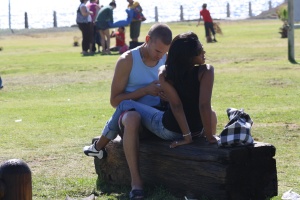
The 4th image in the series on men and love in Africa. Ah, young unafraid love! Like.
The image was taken on the afternoon of Wednesday, March 21, 2012. March 21 is a public holiday in South Africa. Human Rights Day.
A thought: why do human rights have nothing to do with love? Why can’t love, if it is that important, be a human right? Seems that the neglect of love as a right implies that you can have equality but you don’t have a right to love. You can have rights to dignity, education and liberty, but you can’t have the right to affection, care, kindness, self-esteem and great sex. Why not? I think the lawyers, judiciary and politicians will say something about problems in enforcement. So it looks like it makes sense. But does it really?
I recall to mind a legal case that struck me years back that said something along those lines. An ‘illegitimate’ child of the former rugby star Naas Botha was claiming for damages of nearly half a million rand for emotional suffering caused by the father’s refusal to love him. I remember that the judgment went against the child. The court said something like exhortations such as love one another have no place in law. It said the law cannot create love where none exists.
Of course, thus far, all this appears to make sense. The law cannot make others love us, or for us to be more loving. It makes sense. But, hang on. Does has the law not been implicated in creating hatred, or at least helping to create conditions in which feelings of antipathy flourish.
Take South Africa, the US, or, in fact, any other society where intergroup conflict is part of the culture. In many of these countries, the law (and other law-like rules, policies, norms, etc) was part of the arsenal of segregation and different forms of apartheid. Segregation was on the basis of race, class, gender, sexual orientation, or other bases. Therefore, the law might argue that it has nothing to say on love, yet, by its very purpose, segregationist legislation, policies, etc are surreptitiously or overtly intended to thwart ‘love’ (in the broad sense of the word, referring to feelings of affection and care toward another person or oneself) relations other than the legalised ‘love’.
Hence, even if the law claims it cannot create love, it often creates conditions for the opposite of love. Even if the court said it cannot create love, the law often helps in creating obstacles to love. Why, if it can produce grounds for hatred, does the law not help create conditions for finding love?
Love should be a right of sorts. We can write laws and policies that make it possible to meet others more easily so that we can fall in love. Yes, we can.
Till then, what if we taught love alongside equality to the young ones? What if we taught them to love without fear or aggression? Maybe that will be even better than a legal right to love. Actually, who needs a law, when you can get to love without it? (We all do, actually). Teaching love might encourage more young men and women of my country to start saying wild things like, ‘if I don’t get the free, equal, unashamed love that is my birthright, I can’t be with you’. And that, I suspect, would change the world.
Or change something.
- Comment
- Reblog
-
Subscribe
Subscribed
Already have a WordPress.com account? Log in now.
The law doesn’t control your emotions only your actions. So law can’t make a father love his child, but it can make him pay child support to make sure the child is taken care to best of his ability.
The same with inter-group conflict. The law can’t change your perception (bias) on how you view someone based on their race, religion, gender etc….but it can stop you from discriminating (not hiring, refusing service based on that) its not illegal to think like a bigot but your discriminating actions are illegal.
But doesn’t the law help in shaping emotions and thought? It might not make the father love his child, but it has created conditions, or reproduces conditions, in which fathers can opt out from taking responsibility for their offspring. Mothers tend to be left with the babies, so to speak.
Same with intergroup hatred. The law is one of the main resources for the state to help shape (or stop or not) behaviour, but also our perceptions and thought and affect with regards to gender, race, religion, sexuality etc.
No not really the law. The media has more influence in shaping thought and perceptions. Just cause drugs are illegal, doesn’t stop it from being a very profitable industry (lots of Americans take drugs, and now some states are legalizing or decriminalizing small amounts of pot)
No doubt: the media has great influence. Agreed. But the media cannot forbid you from doing things, it only influences. It can influence you from taking pot, but it can’t stop you. On the other hand, the law, as part of the state, can do that. As part of the state it has power. And power has the ultimate say on what we can and can’t do, yes?.
Yes, but you were talking about perception, thoughts, and emotions. Again the law does not control that. The law can try and control behavior (to some degree, obviously drugs are still available and discrimination still happens), but it’s use is not to change someone’s bias or perception. The law is neutral on that.